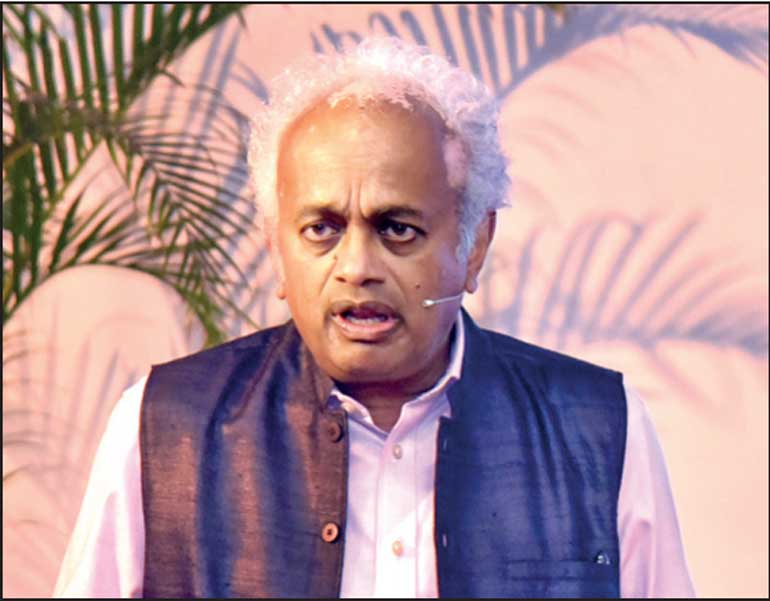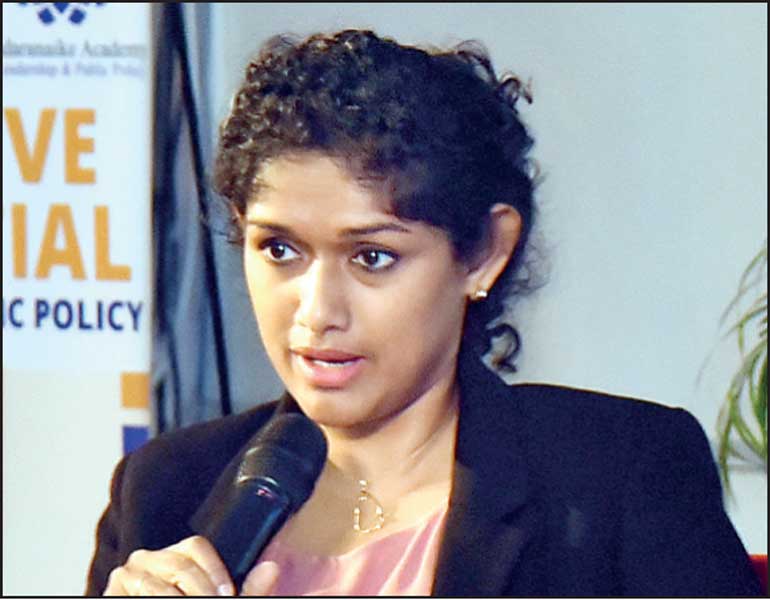Tuesday Feb 17, 2026
Tuesday Feb 17, 2026
Wednesday, 17 July 2024 00:00 - - {{hitsCtrl.values.hits}}

Non-Resident Fellow at Verite Research Prof. Shanta Deverajan

Verité Research Governance and Anti-Corruption Head Sankhitha Gunaratne
By Darshana Abayasingha
Pursuing structural reforms is critical to ensure Sri Lanka achieves sustainable inclusive growth, the Verité Research and Bandaranaike Academy for Leadership and Public Policy organised forum on Practical Solutions highlighted yesterday.
Discussing ‘Practical Solutions for Inclusive Growth’, Verite Research Non-Resident Fellow Prof. Shantha Devarajan, said Sri Lanka must learn to separate foreign policy from foreign investment. He noted that despite criticism, International Sovereign Bonds can hold the Government to account and demand performance or run the risk of downgrades, as official Government-to-Government credit often comes with geopolitics. Devarajan noted that as Sri Lanka grew its reliance on ISBs there has come the risk of high interest costs tied to Government corruption, “but it could also hold the Government to account,” he said.
Prof. Devarajan also said Sri Lankans must learn to hold Governments accountable for their actions, but this has been lacking for the past 70 years that has led to the current crisis. Discussing several points to promote inclusive growth, the Non-Resident Fellow stressed on trade liberalisation, and pointed to the rapid growth witnessed in Sri Lanka after the market was opened up in 1979.
“The growth curve stayed steep for a long time during then and that wasn’t an accident. There were some arguments against liberalisation back then from local garment manufacturers stating the market will have cheap imports. But the opposite happened, because investors moved in and Sri Lanka exceeded other markets and unemployment fell. Apparel is our highest export today. So, trade liberalisation is one of the most pro-poor policies we took. But, now the opposite is happening with these protectionist policies blocking imports to protect some industries. This also drives corruption,” he stated.
Devarajan’s argument to liberalise trade was supported by Verite Research Director Subhashini Abeysinghe who pointed out there will be those who will gain and lose through this process. She stressed on the need to devise complementary policies to narrow losses, but Sri Lanka has many regulatory bottlenecks. Abeysinghe also pointed to the need to revamp labour regulations. She showed it is near impossible for industries to downsize in order to become more competitive. Sri Lanka needs more labour market policies that make room for transition and growth of skills, and educate people on transformation so there is less resentment and more acceptance of liberalisation.
“In terms of trade facilitation, if we look at some of the Far East markets, both imports and exports are doing well with liberalisation. Automation and connecting agencies are important. We started some, but never got going. We have never built public support for liberalisation and that is exploited for political reasons. Also, for 70% of trade facilitation, Sri Lanka told the WTO we need technical support. Even the least developed countries asked for about 40%. So, there is significant lethargy or lack of commitment on the part of Sri Lanka to get these done,” Abeysinghe stated.
Devarajan also pointed to agriculture as a lagging sector where productivity has hardly grown, and listed paddy as one of the least productive crops that engages almost 50% of farmers. He noted this is mostly because policies bind famers to paddy, where the paddy land act is more a political bargaining tool as opposed to a growth policy. He encouraged Government and other agencies to devise regional trials and fast track solutions to boost the agriculture sector.
Devarajan also listed subsidies as much more corrosive than just an impact to the budget, but people continue to advocate for more subsidies that just makes the rich richer. He stressed that 50% of subsidy benefits go to the richest 20% of the population and suggested eliminating subsidies and doing targeted cash transfers instead. Another point stressed by Devarajan was to drive reform within the Education system, as despite literacy and a purported free education system that supports the poor, 60% of poor spend excessively on private tutoring as the formal education system doesn’t work.
“Our free education system runs parallel to the private tutoring system. This applies to the poor too. We designed free education for the poor, but if 60% of the poor have to pay then there is a problem. It is prudent to make teachers and schools accountable,” he added.
During the panel discussion, Abeysinghe responded to queries if we may undermine food security through agricultural reforms and stated the current policy simply focuses on paddy cultivation and not promotes food security for the nation. She pointed out that reducing the workforce in agriculture does not reflect a drop in agricultural output, as strategic crop planning and production could boost productivity and output and exports. “We are protecting a sector that doesn’t provide either of this. We lag far behind in productivity,” Abeysinghe said.
Verite Research Governance Head Sankhitha Gunaratne, touched on regulations and progress surrounding corruption and said anti-corruption measures must be introduced within revenue generation agencies, and this has been pointed out by the IMF, but this aspect seems to have been left out in the Government’s plan. “That is quite telling. Corruption in Sri Lanka is macro critical.” Corruption within the Customs Department is a huge problem for businesses to run, she said, and it almost appears the Government has given in and is unable to fix it, she said. “What can solve it is usually some external shock. That’s where we are today. But yet we seem unable to solve it. One way is for industries to band together and resist, which is easier said than done, but could lead to progressive action against extortive practices.